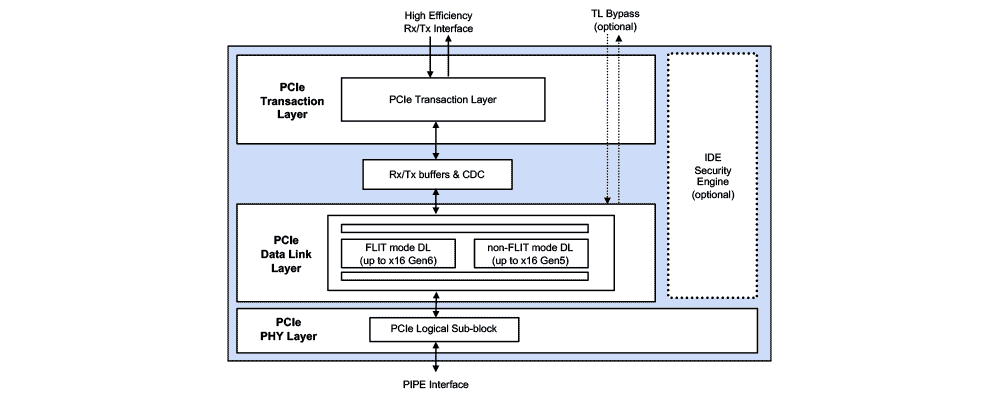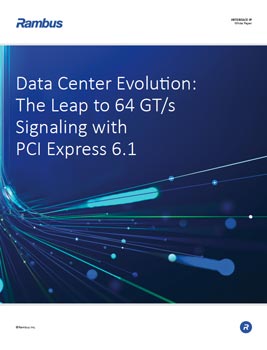PCIe 6.1 Controller
Home > Interface IP > PCI Express Controller IP > PCIe 6.0 Controller
The PCI Express® (PCIe®) 6.1 Controller is configurable and scalable controller IP designed for ASIC implementation. The controller supports the PCIe 6.1 specification, including 64 GT/s data rates, PAM4 signaling, FLIT mode, and L0p power state. The PCIe 6.1 architecture will be essential for SoC designers creating next-generation chips that require the movement of large amounts of data within systems, including applications like HPC, cloud computing, artificial intelligence/machine learning (AI/ML), enterprise storage, networking, and automotive.
How the PCIe 6.1 Controller Works
The PCIe 6.1 controller is backward compatible to the PCIe 5.0, 4.0 and 3.1/3.0 specifications. It supports version 6.x of the PHY Interface for PCI Express (PIPE) specification. The controller exposes a highly efficient transmit (Tx) and receive (Rx) interface with configurable bus widths. Designed to satisfy a multitude of customer and industry use cases, the IP can be configured to support endpoint, root port, switch port, and dual-mode topologies, allowing for a variety of use models. The provided Graphical User Interface (GUI) Wizard allows designers to tailor the IP to their exact requirements, by enabling, disabling, and adjusting a vast array of parameters.

The controller can be delivered standalone or integrated with the customer’s choice of PCIe 6 PIPE compliant SerDes. It can also be provided with example reference designs for integration with FPGA SerDes.
Data Center Evolution: The Leap to 64 GT/s Signaling with PCI Express 6.1

The PCI Express® (PCIe®) interface is the critical backbone that moves data at high bandwidth and low latency between various compute nodes such as CPUs, GPUs, FPGAs, and workload-specific accelerators. With the rapid rise in bandwidth demands of advanced workloads such as AI/ML training, PCIe 6.1 jumps signaling to 64 GT/s with some of the biggest changes yet in the standard.
Solution Offerings
PCI Express layer
- Designed to the latest PCI Express 6.1 (64 GT/s), 5.0 (32 GT/s), 4.0 (16 GT/s), 3.1/3.0 (8 GT/s), and PIPE 6.x (8, 16, 32, 64 and 128-bit) specifications
- Supports SerDes Architecture PIPE 10b/20b/40b/80b width
- Supports original PIPE 8b/16b/32b/64b/128b width
- Compliant with PCI-SIG Single-Root I/O Virtualization (SR-IOV) Specification
- Supports multiple virtual channels (VCs) in FLIT and non-FLIT modes
- Supports Endpoint, Root-Port, Dual-mode, Switch port configurations
- Supports PCIe 6.1 to PCIe 1.0 speeds
- Supports Forward Error Correction (FEC) – Lightweight algorithm for low latency
- Supports L0p Low Power mode
- Up to 4-bit parity protection for data path
- Supports Clock Gating and Power Gating
- RAS features include LTSSM timers override, ACK/NAK/Replay/UpdateFC timers override, unscrambled PIPE interface access, error injection on Rx and Tx paths, recovery detailed status and much more, allowing for safe and reliable deployment of IP in mission-critical SoCs
User Interface layer
- User-selectable Transaction/Application Layer clock frequency
- Sideband signaling for PCIe configuration access, internal status monitoring, debug, and more
- Optional Transaction Layer bypass
Integrity and Data Encryption (IDE) – Optional
- Implements the PCI Express IDE ECN
- Configurable IDE engine
- Configurable data bus for PCIe IDE
- Supports containment and skid modes
- Supports multi-stream
- Utilizes high-performance AES-GCM for encryption, decryption, authentication
- PCIe IDE TLP aggregation for 1, 2, 4, 8 TLPs
- PCIe IDE automatic IDE prefix insertion and detection
- PCIe IDE automatic IDE sync/fail message generation
- PCRC calculation & validation
- Efficient key control/refresh
- Bypass mode
Unique Features & Capabilities
- Internal data path size automatically scales up or down based on max. link speed and width for reduced gate count and optimal throughput
- Dynamically adjustable application layer frequency down to 8 Mhz for increased power savings
- Optional MSI/MSI-X register remapping to memory for reduced gate count when SR-IOV is implemented
- Configurable pipelining enables full speed operation on Intel and Xilinx FPGA, full support for production FPGA designs (when supported)
- Ultra-low Transmit and Receive latency (excl. PHY)
- Smart buffer management on receive side (Rx Stream) allows implementation of custom credit management schemes in the application logic
- Merged Replay and Transmit buffer enables lower memory footprint
- Advanced Reliability, Availability, Serviceability (RAS) features include LTSSM timers override, ACK/NAK/Replay/UpdateFC timers override, unscrambled PIPE interface access, error injection on Rx and Tx paths, recovery detailed status and much more, allowing for safe and reliable deployment of IP in mission-critical SoCs
- Optional Transaction Layer bypass allows for customer specific transaction layer and application layer
- Optional QuickBoot mode allows for up to 4x faster link training, cutting system-level simulation time by 20%
IP files
- Verilog RTL source code
- Libraries for functional simulation
- Configuration assistant GUI (Wizard)
Documentation
- IP Reference Manual
- Getting Started Guide
Reference Designs
- Synthesizable Verilog RTL source code
- Simulation environment and test scripts
- Synthesis project & DC constraint files (ASIC)
- Synthesis project & constraint files for supported FPGA hardware platforms (FPGA)
Advanced Design Integration Services:
- Integration of commercial and proprietary PCIe PHY IP
- Development and validation of custom PCIe PCS layer
- Customization of the Controller IP to add customer-specific features
- Generation of custom reference designs
- Generation of custom verification environments
- Design/architecture review and consulting



